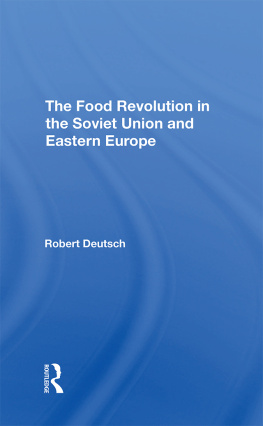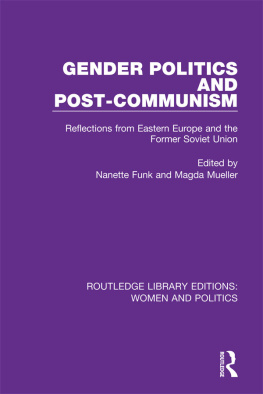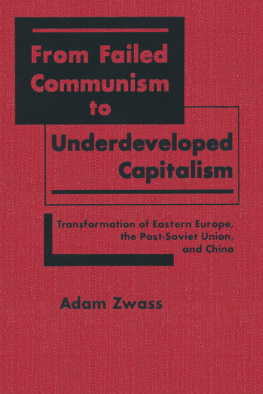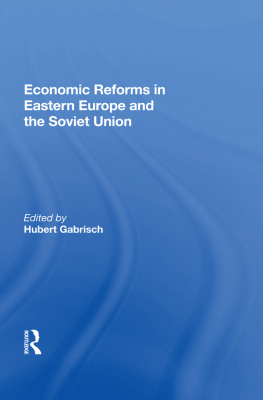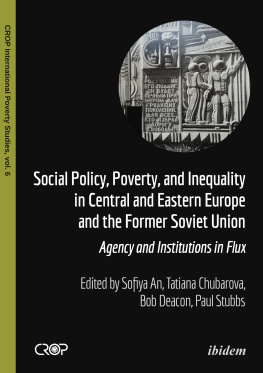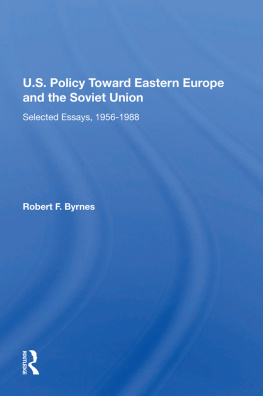Generation in Jeopardy

Note: The map does not reflect a position by UNICEF on the legal status of any country or territory, or of its authorities, or the delimitation of any frontiers.
This book is based on papers commissioned by the United Nations Children's Fund (UNICEF), and the content does not necessarily reflect the views or policy of UNICHF.
The designations employed in this publication and the presentation of the material, including maps, do not imply on the part of UNICEF the expression of any opinion whatsoever concerning the legal status of any country or territory, or of its authorities, or the delimitations of its frontiers.
Generation in Jeopardy
Children in Central and Eastern Europe and the former Soviet Union
United Nations Children's Fund
Edited by Alexandre Zouev
With a foreword by Sir Peter Ustinov
Credits for cover photographs (clockwise): A girl from Almaty, Kazakhstan, UNICEF/ C-116/Maines; refugees near the city of Banja Luka in Bosnia and Herzegovina, UNICEF/95-0819/Lemoyne; schoolgirls in Kosovo, UNICEF/98-0216/Hartley; a girl picking cotton in Turkmenistan, UNICEF/97-0534/Murray-Lee.
First published 1999
by M.E. Sharpe
Published 2015
by Routledge
2 Park Square, Milton Park, Abingdon, Oxon OX14 4RN
711 Third Avenue, New York, NY 10017, USA
Routledge is an imprint of the Taylor & Francis Group, an informa business
Copyright 1999 Taylor & Francis. All rights reserved.
No part of this book may be reprinted or reproduced or utilised in any form or by any electronic, mechanical, or other means, now known or hereafter invented, including photocopying and recording, or in any information storage or retrieval system, without permission in writing from the publishers.
Notices
No responsibility is assumed by the publisher for any injury and/or damage to persons or property as a matter of products liability, negligence or otherwise, or from any use of operation of any methods, products, instructions or ideas contained in the material herein.
Practitioners and researchers must always rely on their own experience and knowledge in evaluating and using any information, methods, compounds, or experiments described herein. In using such information or methods they should be mindful of their own safety and the safety of others, including parties for whom they have a professional responsibility.
Product or corporate names may be trademarks or registered trademarks, and are used only for identification and explanation without intent to infringe.
Library of Congress Cataloging-in-Publication Data
Generation in jeopardy: Children in Central and Eastern Europe and the former Soviet
Union / by United Nations Children's Fund (UNICEF): edited by Alexandre Zouev.
Includes bibliographical references and index.
ISBN 0-7656-0121-4 (cloth: alk paper). ISBN 0-7656-0290-3 (pbk.: alk paper)
1. ChildrenEurope, EasternSocial conditions. 2. ChildrenFormer Soviet republics
Social conditions. 3. Child welfareEurope, Eastern. 4. Child welfareFormer Soviet
republics. 5. Europe, EasternSocial conditions1989. 6. Former Soviet republics
Social conditions. I. Zouev, Alexandre. II. Title.
HQ792.E82U55 1998
305.23'0947dc21 98-13833
CIP
ISBN 13: 9780765602909 (pbk)
ISBN 13: 9780765601216 (hbk)
Contents
PART ONE
Social conditions: Children's welfare and families' access to basic social services |
PART TWO
Child protection: Children in especially difficult circumstances |
PART THREE
Different faces of the transition: Area highlights |
| CHAPTER ONE |
| CHAPTER TWO |
| CHAPTER THREE |
| CHAPTER FOUR |
| CHAPTER FIVE |
| CHAPTER SIX |
| CHAPTER SEVEN |
| CHAPTER EIGHT |
| CHAPTER NINE |
| CHAPTER ELEVEN |
| CHAPTER TWELVE |
| CHAPTER THIRTEEN |
| CHAPTER FOURTEEN |
| CHAPTER FIFTEEN |
| CHAPTER SIXTEEN |
| CHAPTER SEVENTEEN |
| CHAPTER EIGHTEEN |
One of the most moving experiences of my life was a recent trip I took for UNICEF to report on the state of children in the Russian Federation, one of the many countries in the region facing the cruel climate, as well as the advantages, of economic and political change. The population, from the anthills of the metropolis to the sparse regions of Siberia, was true to the spectrum of sharply drawn characters found among the pages of Dostoevsky.
I can never forget the children's hospital I visited in Chelyabinsk, a city in western Siberia that had formed part of the former Soviet Union's vast nuclear weapons complex. There, the condition of the patientschildren suffering from leukemiawas heartbreaking. For many years before the nuclear disaster of Chernobyl, impossible to hide because of the contaminated clouds that spread far beyond the frontiers of the then Soviet Union, Chelyabinsk had suffered from several nuclear catastrophes, but they were covered up thanks to the area's relative remoteness.
Today, the hospital itself is practically devoid of staff, apart from a small handful of poorly paid doctors and technicians. All the services, such as cooking, laundry, and cleaning, are assumed by the families of the children under treatment, who have moved in to replace the staff who had left. Their example of improvisation in an emergency is typical of the entire nation.
If there are still those who regard the nuclear weapon as an effective deterrent, they should be compelled to visit this hospital as a therapy, to wean them from their complacency. No such deterrent can exist without risk, as these victims, born long after the accidents and careless nuclear waste disposal, can testify. As Shakespeare so wisely said, "The evil that men do lives after them."
I remember with a shudder two adorable five-year-old twins in the Kuzbas, central Siberia, dolled up in their party best with ribbons in their hair to greet foreign visitors to their kindergarten. They curtsied and smiled engagingly in an old-fashioned way. It was only after responding to their welcome that I learned they had been abandoned by their parents, both addicted to the bottle. Departing on a spree from which they never returned, these parents had simply locked the children in their apartment to fend for themselves. Indeed, the great scourge of alcoholism is felt the length and breadth of the land. Rehabilitation centers are full of children marked by fetal alcohol syndrome, a prenatal affliction of the most terrible kind.
A young man I met in a crumbling boys' hostel in St. Petersburg became a symbol of the temptations, and the dangers, as well as the hidden strength, of this reawakened nation. This red-cheeked lad of 13, bursting with health and energy, was twirling a wooden revolver on his index finger when I first encountered him. I said I was glad it was not a real one. He smiled enigmatically, without comment. He told me his speciality was the theft of motor bicycles. To that end, he usually slept on a bench in a railway station, waiting for those who carelessly left their mounts unattended. He thought he might well be an orphan, although he couldn't be sure. At all events, he didn't know if his parents existed, or had ever existed. All his life he had been alone.



